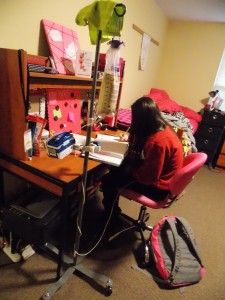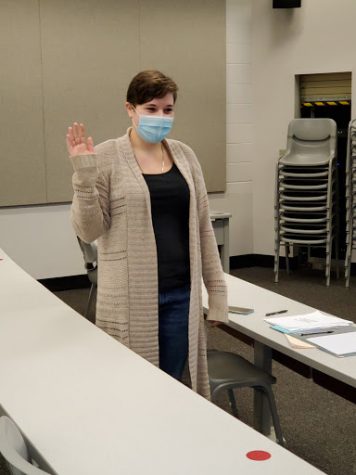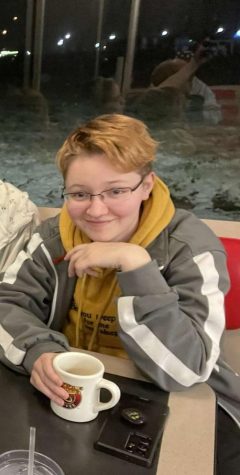A lifelong battle:
Student fights daily to keep herself fed
A single serving pot of black coffee sits in the refrigerator overnight waiting for Kristi Roach, nursing junior, to shoot three syringes full of it directly into her stomach.
The coffee is the only caffeine she takes in. She savors the buzz.
Roach is forced to consume food and beverages this way. She learned in March 2012 that she has gastroparesis. The disease hinders her ability to eat or drink because it paralyzes her digestive tract. In August 2012,
Roach had a feeding tube inserted into her jejunum, a part of the small intestine.

Due to her inability to eat or drink, Roach has to find a way to keep herself from dehydrating. Sucking on ice cubes is the only way, and though it often leaves her feeling sick, she has a cup of ice daily.
She lives a daily struggle, avoiding food and beverages so she does not become physically ill; however, Roach said she believes there is a reason for her situation and does not let it get her down.
“I rely on my friends, boyfriend and family to help me stay strong,” Roach said. “I just have to remind myself that even though I may not be cured, each day that I live to beat gastroparesis is a miracle in its own way.”
In her dorm room, a bright smile dances across Roach’s face as she automatically tucks the tube under her shirt. Her eyes flutter to the side; she looks down brushing at her shirt some more. The smile is unwavering. When an average girl her age could easily whine and complain at her situation, Roach smiles, Gina Johns, Roach’s mother, said.
In the classroom, Roach sets a backpack on the floor. A cord with cream traveling up the tube was hanging from the bottom of her shirt. A few girls asked about the backpack and the tube connected to her stomach. “Oh, I can’t eat.” Roach responds with a smile and a small laugh.
This came as a shock to Roach’s roommate, Melanie Zierten, psychology sophomore, who said she had never heard of the disease before. Zierten said although the guilt she initially experienced with eating around Roach has eased, it is still something she does not make a habit of.
Roach said she seldom carries her feeding tube to class and does not like to carry it in public. Once people learn there is something different about her, they treat her differently, Roach said. Normal situations become awkward for her.
“I went to a restaurant with my friends; when I ordered a cup of ice the waiter thought I was joking,” Roach said, “He told me if I were too broke he would give me a drink for free. Finally my friends told him that I couldn’t eat and have a feeding tube. He acted really weird after that. He brought silverware to the table and ended up giving the person next to me two sets because he didn’t know what to do.”
The stomach problems had started out as what Johns called a stomach virus. Johns noticed Roach would get sick more than most people she has known, but her concern was that Roach, instead of avoiding food for a few days, wanted to eat through it.

Every couple of months she would be sick for several days. Excess vomiting led to dehydration, which led to immediate care center trips to get fluids through an IV.
Struggling through sickness and pain was difficult, but struggling with her situation through high school was worse. Other students treated Roach harshly. Because she would get sick after eating, other students called her bulimic. They used to ask why she would bother to eat if she was just going to get sick. The bullying led her to the guidance office where she ate her lunches alone, and to her dismay, the counselors did not help ease the pain.
“The worst was when a guy in my Spanish class loudly stated that I should have been aborted,” Roach said, “I went home crying.”
School, a place she once loved, became a nightmare until her senior year, when she switched schools. Students at Silver Creek High School were nicer to her, Roach said.
Although school became less stressful, trips to the doctor remained frustrating. Doctors could not explain why Roach continually got sick.
“I was at the immediate care center the night before graduation. I was so weak I barely made it through. I couldn’t even go to my friend’s graduation parties, I was so sick,” Roach said.
Bouts of sickness had stopped for a couple of months after she had her appendix removed, and then surfaced more often, Roach said.
In November 2011 Roach spent two weeks in the hospital. She shed 20 pounds; she became malnourished and discouraged without knowing the source of the problem. Luckily, her mom found a doctor in Indianapolis who tried to rule out everything.
In March 2012, Roach’s doctor had her eat dyed eggs and took pictures of the eggs traveling though her body
every 15- 30 seconds for four hours. The doctor discovered that her stomach did not function. She received her diagnosis: gastroparesis. Her vagus nerve, a control center for many bodily functions, is damaged.
“There are people in worse situations than I am,” Roach said. “I try to stay happy. It’s hard, but there is a reason I’m going though it. I trust that God has a plan. I have to smile about something.”
On Aug. 20, 2012, Roach received her feeding tube. During the surgery her doctors accidentally overdosed her and she was not allowed to have any pain medication for 24 hours. However, the night of her surgery, without pain medication and in so much pain she could hardly move, Roach was trying to walk the hallways in the hospital. Move-in day on campus was three days away, and she was determined to make it, despite reassurance from family that if she sat out a semester they would not think any less of her.
“There is a Facebook page dedicated to people with my disease,” Roach said. “It seems like most of them don’t do anything and draw disabilities. I don’t want to be like that. I want to have a life as close to normal as it can be.”
Part of living a normal life for Roach includes going to school. Roach is majoring in nursing. Due in part to her time spent in immediate care centers and hospitals, she said she feels comfortable enough in the surroundings that it has inspired her to help other people by being a nurse.
School and working out also keep her mind off food. Roach said her faith also keeps her grounded.
“Kristi has a strong faith in God,” Johns, Roach’s mother, said. “It’s helped her keep her smile. I’ve never heard her say ‘why me?’”
Johns choked on tears as she marveled at her daughter’s strength.
“I don’t understand,” Johns said. “I’m proud of her, but I don’t know how she stays positive. Kristi kept her smile though the worst of it and was always positive.”
Zierten also said she is amazed by Roach’s strength.
“She’s always so positive and strong,” Zierten said. “I would never be able to act how she does. I know she has a close relationship with her mom and God, but still. It amazes me how she can be like that with all she has to go through.”
Roach said she knows it is important for her to stay strong.
“It’s hard, but I have to be strong. I don’t like to complain. I don’t want people feeling sorry for me.” Roach said. She let a huge smile spread across her face as she brushed at her shirt, tucking her tube under it, again.
















